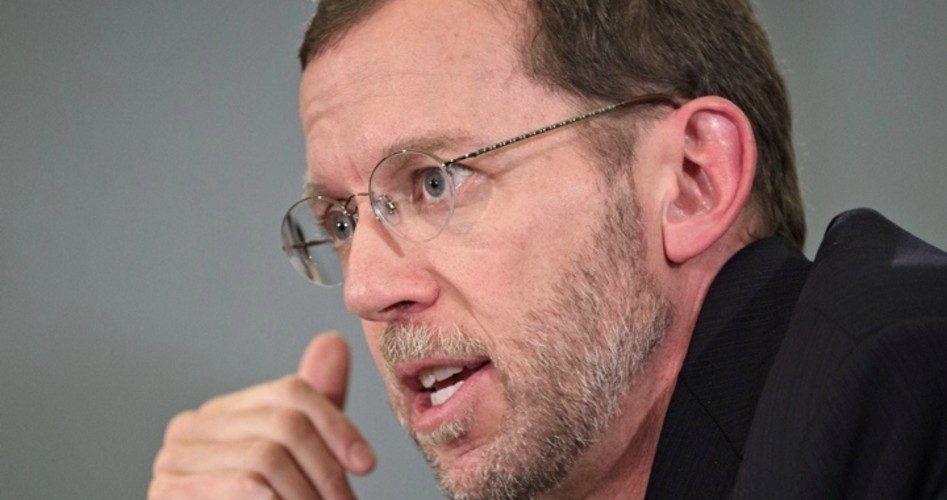
Congressional Budget Office Director Doug Elmendorf testified on Wednesday before the House Budget Committee about the federal government’s “Long Term Budget Outlook.” His office just released its latest study which showed two scenarios: one bad, the other worse.
Said Elmendorf:
It is not possible to keep taxes at their [present level] and keep the laws unchanged for Social Security, Medicare and Medicaid…
It is possible to keep taxes at their [present level] but only by making substantial cuts…in [those] large entitlement programs…
Alternatively, it is possible to keep…[those] large entitlement programs unchanged but only by raising taxes substantially on a broad group of Americans…
Even if spending on…other programs [outside the entitlement programs] fell to a smaller share of GDP than we’ve seen at any point since World War II, debt would still be on an unsustainable upward trajectory…
That’s what is facing Congress as 34 Senators and 435 members of the House are deep into their reelection campaigns. And all that Congress is likely to do is use Elmendorf’s comments and his office’s analysis as fodder for their constituents to help them keep their jobs.
A spokesman for likely Republican presidential nominee Mitt Romney said, “Today’s CBO report confirms that President Obama has placed us on a path to fiscal ruin.” President Obama said that it’s President Bush’s fault, since he signed into law those “Bush tax cuts” that resulted in the $15.7-trillion deficit.
House Budget Committee Chairman Paul Ryan echoed Romney: “Today’s CBO report on the deteriorating fiscal situation underscores the obvious: the president’s policies are not working.” He added:
Repeating Europe’s mistakes, the president’s policies call for job-crushing tax increases and harsh disruptions for beneficiaries of government programs as the debt spirals out of control…
CBO’s report is the latest in a series of warnings for policymakers to advance principled solutions that responsibly confront our generation’s most pressing challenges.
House Minority Whip Steny Hoyer retorted:
CBO’s report is warning that we must get our fiscal house in order by achieving big and balanced deficit reduction that includes both spending and revenues.
However, Republican leaders’ insistence on finding savings only from cuts to essential services for the most vulnerable Americans will not get us any closer to the real, comprehensive deficit reduction solutions that we need.
The CBO ran scenarios based on two different sets of assumptions. Its “extended baseline scenario” assumed that present law stays in place. That translates into the ending of the Bush tax cuts, the re-imposition of the Alternative Minimum Tax and the estate tax, and the new taxes built into ObamaCare. The CBO estimates that the government’s revenues would gradually increase from its current level of 18 percent of GDP, or about $2.5 trillion annually, to 24 percent of GDP, or about $3.4 trillion, an increase of approximately 35 percent over the next 25 years. This is the CBO’s estimate of the impact of “taxmageddon” (or hitting “the cliff”) at the end of the year.
But even this wouldn’t reduce the national debt, as it would only slightly, and slowly, reduce the annual deficits over those years.
And that’s the best case. The other scenario, which CBO calls the “extended alternative fiscal scenario,” assumes that all expiring tax breaks will be extended by Congress for the next 10 years. This would increase the annual deficits to the point where, according to the CBO, the total national debt would grow to a level nearly three times higher than it is currently over the next 25 years. Putting some numbers on it means that the national debt, currently at $15.7 trillion, would, under this scenario, reach nearly $45 trillion.
The CBO also admits that taking that amount of money out of what’s left of the private economy, coupled with the inevitably higher interest rates the government would have to pay to get its lenders to keep lending, will take a big bite out of economic growth. The CBO estimates that the economy will be at least four percent less productive under the best scenario and 13 percent less productive under the worst scenario.
What’s clear but unspoken is that the endgame is very near. Even if somehow Congress acts prudently, the race to the cliff will likely continue to accelerate.
Photo: Congressional Budget Office (CBO) Director Doug Elmendorf testifies, Feb. 1, 2012, before the House Budget Committee: AP Images



